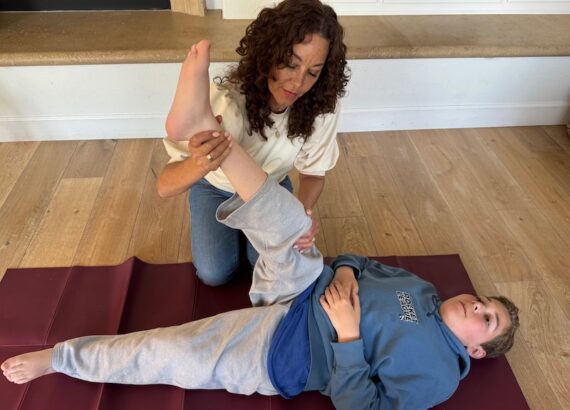How to Become a Planner: Rare-Disease Planning

Planning May Not Be Sexy But it Will Save Your Busy Butt!
Planning. You either love it or you hate it. You either think of yourself as spontaneous or as a planner. If you’re spontaneous, maybe you worry that planning will take the fun out of being spontaneous. Girl, I hear you. But having navigated the rare-disease road, let me tell you, mama, it’s time to leave spontaneity to dinner plans and Saturday outings. When it comes to walking through this rare-disease world, it’s time to strap on your rare-disease planning boots.
When you’re thrown into the special-needs world and your to-do list is miles long, you’re going to need a roadmap on how to get from A to Z. Coming up with a plan and a breakdown for how to get what you need done just may be your saving grace. The good news is that even though you may have never been a planner, it’s a skill you can learn and acquire. Dare I say you might even like it?
I’m definitely the planner type. My former career even had it in my job title. I became accustomed to planning, and I relied on it as a way to get work done and manage stressful deadlines and projects. However, when I was hurled into the rare-disease world, I didn’t realize what an invaluable skill it would be to allow me to navigate all that was before me. It has helped so tremendously that I want to share it with you and offer rare-disease planning as a necessary tool for helping you navigate daily life.
Having a child with a rare disease comes with a list of specialists to manage. Those specialists come with numerous appointments, evaluations, paperwork, and follow-ups. Our children may also have therapies and equipment that need to be managed, as well as insurance and state programs to oversee. All of this may come on top of managing schooling and regular activities. Let’s be honest, for children with a rare disease, even “regular” activities come with more thought, considerations, and inevitably more time. Things take longer for families like ours. We need to build in more time for even the everyday and most normal of activities. With all the additional to-dos for rare parents and the extra time needed for regular activities, there doesn’t seem to be enough time in the day to do it all.
Enter your rare-disease plan.
In order to be able to complete whichever of the tasks you are trying to tackle but to still be able to take care of the everyday necessities, you’ll have to get real specific about how long regular activities take you and how long the task you’re trying to accomplish will take you. Confucius once said, “A man who does not plan long ahead will find trouble at his door.” Girl, I don’t want any trouble showing up at your door. Mama has enough to deal with. You wanna know the key to staving off trouble from your door? Planning ahead!
You’ve probably also heard “If you don’t have a plan, you plan to fail.” I believe the more time you spend planning up-front, the less overwhelmed you will become, the less burned out you will feel, and, ultimately, the more successful you will be in accomplishing the task you set out to do. Let’s plan to succeed.
So how do you plan ahead?
- Get it down on paper
- Anticipate needs
- Ask what-if questions and consider worst-case scenarios
- Prioritize actions
- Schedule it on your calendar
- Build in a cushion
- Review and adjust
I’d like to illustrate this rare-disease planning method with a real-world example to help show you how this might unfold. Let’s use the example of something many of us have to do: take our children to many medical appointments and have healthcare insurance in place. But getting healthcare in place comes with many steps and can feel overwhelming. Many of us don’t know where to start, and a lot of us don’t have deep knowledge about the inter-workings of insurance. So how do you tackle this task?
1. Get it down on paper
First, get everything that is running around in circles in your mind down on paper. If I can illustrate the inside of my head during times when I’m trying to figure something out, I would compare it to a circus. There are dogs barking and jumping through hoops; acrobats flying through the air; clowns walking by doing pratfalls and rolls, honking horns, and squirting water; and motorcycles doing death jumps in the Ring of Fear. All of this equals noise, noise, and more noise. It’s complete chaos and it needs to be wrangled before the contents under that circus tent blow the lid right off!
If your head is anything like mine, you’re going to need to grab yourself a pen and paper and write it down. Get the dogs out, the acrobats accounted for, and the clowns cornered. Once you’ve got that circus sequestered on paper instead of running rampant in your head, you’ll free up space and your overworked mind might just be able to think again. This is a critical first step in rare-diseae planning.
So for the example of seeking out healthcare for my child, maybe some of the steps I need to take are calling my employer or my spouse’s employer and getting benefits information. Or asking my social worker at my child’s hospital or doctor’s office about Medicare. Or going on my state’s Medicare website. Or talking to that other woman in my town whose child has special needs. Maybe I can look at my state’s website for children with disabilities and call my county’s healthcare office. Write all these ideas and steps down so you don’t forget them as they pop in and out of your mind. You’re starting to make a working list of the items you will tackle.
2. Anticipate needs
The next step in rare-disease planning is to anticipate needs. Think about the activity or event on your plan. What needs will you have that day? What needs will your child have? What are the time elements associated with doing these tasks?
For example, let’s say you discover that in order to obtain healthcare for your child, you will need to apply for Medicare. The Medicare application is ten pages long and requires you to locate and include financial information. Realistically, you approximate that it will take you roughly three hours to complete the application (I can’t remember how long it took, I’m just pulling this number out for example purposes). Where are those three hours going to come from? What is the deadline in which you must complete the application? What if your schedule doesn’t allow you to be away from your child for three hours to complete this task? What then? You need a plan to get this done.
Your rare-disease plan can look like finding childcare for a three-hour sitting and knocking this out all at once, or maybe it looks like you waking up an hour earlier (before your child wakes up) each day for three days in order to find the time to fill out the paperwork. I don’t know exactly what works best for you, but you’ll have to consider how you do your best work and then design it around that. Here’s the thing: if you leave it up to chance, you could be setting yourself up for frustration and even failure.
Why not set yourself up for success? Why not come up with a specific plan on how to get that application done? This may require a little more work up-front, but in the end it will help you get things done more efficiently.
So make a plan for those three hours and anticipate the needs. The application says it will need household income information, tax return information, and employer information. Make a plan for gathering this up so that when you have the time to sit down and actually do the application, you have what you need. Also, anticipate your child’s needs. For example, what will they need for those three hours if someone else is watching them? Snacks, toys, medication, nap gear, etc. Pack that all up so they have what they need.
3. Ask what-if questions and anticipate worst-case scenarios
Next, ask yourself what-if questions to try and consider things you haven’t thought of that could possibly happen. What if the time you’ve arranged to work on this application is going to interfere with your time to cook dinner? Maybe you need to make dinner ahead of time that day. What if your child will start to feel anxious or start missing you? Maybe you better pack them their favorite lovey or movie. Thinking through the what-ifs will help set you up for success, especially when you’re planning for bigger items like medical procedures and surgeries. This will help you be able to follow through with your rare-disease plan.
Listen, some of these what-ifs may never come to fruition, but if they do, already addressing the questions will help you be prepared and not derail the entire thing you have been planning for and working toward. At the very least, they will help give you peace of mind. And, mama, couldn’t we all use a dose of that from time to time?
4. Prioritize actions
Now that you’ve got everything dumped on paper, and you’ve anticipated needs and thought through all the what-if scenarios, you’ve probably got a lot of things scribbled all over the place. Let’s filter through them, make some sense out of them, and put them in order. Let’s prioritize your list of action items. Put these in chronological order of what needs to happen first, then next, etc. Put the most important things first. So for applying for Medicare, I’ve got a list that includes finding all the financial information, scheduling childcare, making dinner ahead of time, packing my child’s things, etc. I figure out what needs to be done first and put this on the top and make my way down through the tasks. Now, I’ve got a prioritized rare-disease plan that I can start chipping away at.
5. Scheduled it on your calendar
Next, I am going to use my calendar and schedule these rare-disease planning tasks. I take out my calendar and look for days and times I can add these on, and I schedule them just like I would schedule an appointment. Now I have a defined time within which I will tackle these items. Also, if it helps, you can work backward. If you know you have a deadline that, let’s say, is in a month from now, you can look at that date on your calendar, and go back and schedule all the tasks that lead up to that date. If the Medicare application needs to be turned in one month from now, I will go on and schedule the weekly tasks that need to get done leading up to my application due date.
6. Build in a cushion
Next, I will build in a little time cushion. We all have the best intentions for getting things done, but guess what? Life happens. I have had life happen to me too many times to count. Seriously, I could fill a book just on this alone. Almost every single time I’m planning for some big event or activity, something comes up at the last minute. I get sick, my child gets sick, my car has an issue, someone cancels, weather interferes, etc. It’s almost comical when I look back on it. It’s not comical at the time. At the time I want to straight-out lose my mind. Seriously, at those times you would not want to cross paths with me in a dark alley. But what has saved me time and time again is that I was already prepared. The things on my list were already done. So build that cushion into your rare-disease plan from the get-go. Work ahead. Battle all these unknowns with advance preparation.
Listen, I know that much of life is beyond our control and that we won’t be able to plan and account for everything. Life is going to throw you things that were not built into your plan. But by preparing what you can, you will be one step ahead. You’ll be in a much better place than if you didn’t plan at all.
7. Review and adjust
Last, take inventory. See how things played out and review how your plan worked. Where was it successful? Where did it fail? What did you miss? Take mental notes for next time so you can incorporate some of what you were missing into the next item you have to plan.
Maybe in our example scenario you realized three hours was too long of a time chunk for you to sit at your computer or to be entering data. Maybe you became fatigued or hungry and it wasn’t as efficient as you had hoped. So maybe you need to remember that and next time break it down into three hour-long chunks. Or maybe doing it at your house was too distracting. Maybe the dog was barking, you could hear your child in the next room, or you kept getting up to change the laundry. Maybe next time you need to plan to go somewhere outside your house to work, like a coffee shop or library. Be an observer, always taking mental notes as to what will make you more efficient the next go around.
In addition to big events, having a plan will help you tremendously even for the most ordinary of things. The truth is for families like ours, even the most commonplace things require so many extra steps and in turn much extra time. It’s hard for us to be on time and to have everything we need accounted for. I now plan for even the most ordinary events, like attending a birthday party.
For my son, we have extra equipment we always need to bring, like leg braces, his wheelchair, hand sanitizer, etc. After way too many times of forgetting something important for him, like the leg braces, or forgetting something for the event we are attending, like the birthday gift, or having all the things I needed but almost forgetting my kid (ha!), I realized we needed to get some type of system in place. I grew tired of arriving forty-five minutes late with everyone in our household completely frazzled and in bad moods. I got sick of being at the party but not being able to enjoy it because we didn’t think of what would happen if it rained. Or having my kid be upset because he couldn’t eat a cupcake with all the other kids because there was nowhere for him to wash his hands easily, and it was flu season, and some other kid at the party was snotting on everything, and my son has to be extremely cautious about catching even the common cold. So I’ve learned to anticipate needs.
I anticipate the what-if scenarios. I make a list of all the items we may need and pack them up the night before. I put things like gifts and extra jackets and clothes in the car. And it always takes so much longer than I thought. I thought it would take ten minutes to grab all that stuff, but somehow it actually took thirty-five. But it’s okay because it’s the night before and we aren’t trying to rush out the door.
I also look up where the party is and how long it will take to get there and then I build in an extra ten minutes for us to get out of the car and in the door because my son is in a wheelchair and it requires a lot of extra steps. By this time, I’ve usually decided it may not even be worth going to this damn party. “Happy birthday! Your gift is in the mail.” But going to events like this helps us to feel like we’re still participating in the normal events of childhood. So when we have energy, when our health is intact, and when we have time to prepare for them, we try to attend.
The point is, I’ve taken these rare-disease planning steps and applied them to normal life activities and it has helped tremendously. So feel free to use it to get you through the biggest of big, scariest, hardest situations or for even the seemingly ordinary and mundane, which we all know are still real time suckers for families like ours.
Sound exciting? I bet you just can’t wait to try this beyond-fun planning activity! Oh joy!
Like I said, planning may not be sexy, but it will save your busy butt time and time again. Planning has become my jam (I’m nerdy like that). Maybe it will become yours too (I can dream, nerds need friends too). Maybe not. At the very least, you’ll get your crap done and then you’ll have more time for whatever is your jam. Get your planning on!

Ps. If you haven’t already, check out “The 6 Things You Need to Begin Your Rare-Disease Fight.” article on the blog.







